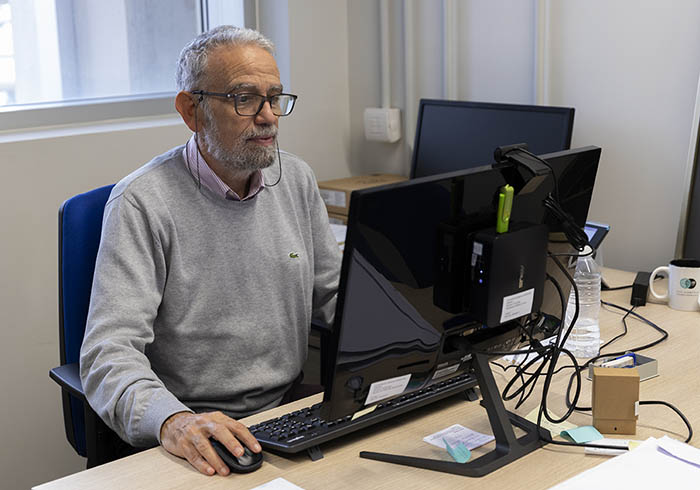Users
Social media
- More details here...
- Address
Parc Científic de la Universitat de València C/
Catedrático Agustín Escardino, 9
46980 Paterna (Valencia) Spain - Email:
iu.i2sysbio@uv.es - Phone:
(+34) 963544810
- Address
Links
This is how we are facing the crisis...

Investigation
This is how we are facing the crisis...

We asked the CSIC staff how they are experiencing the exceptional situation due to COVID-19. José Luis García, director of the Institute of Integrative Systems Biology (I2SysBio, CSIC-UV).
We spoke with José Luis García, the director of the Institute of Integrative Systems Biology (CSIC-UV), who tells us how his center is adapting to the health emergency, what difficulties they are encountering, and what actions they are carrying out to help this crisis end as soon as possible. possible.
How is I2SysBio adapting to the current situation?
Since the state of alarm began we have followed the instructions given to us by the CSIC and the University of Valencia. The first thing we did was reduce face-to-face activity at the institute as much as possible. We are only maintaining essential services, which are fundamentally used to maintain the living collections we have of plants, cells, viruses and insects. This maintenance is necessary so that we can resume the experiments when possible.
We have a minimal administrative presence, and then there is also the maintenance of the building that depends on the University of Valencia. We are granting about 14 or 15 mobility permits to go to the center daily, which indicates that right now there are very few people working there. We keep a record of all the people who enter and leave as requested by the University and the Ministry. Almost all jobs are being done remotely. The students are no longer working either. And the little research activity that continues is related to COVID-19. We have also stopped all lines of research, since the message that has been transmitted to us from the CSIC and the University was that we limit ourselves to essential activities.
What are the biggest difficulties that you are encountering?
Right now we are having a hard time finding PPE supplies thinking about returning to work. We donated everything we had to the Clinical Hospital at the beginning of the crisis. We are also having a hard time getting hydroalcoholic gel. Everything that has to do with the supply of material to be able to work again.
It was not easy to convince the researchers that all activity had to stop, but people understood it well. At first we were more permissive so that people could close their work acceptably. Right now everything is closed. In addition, we have to justify the permissions we give.
With teleworking we are working very well. We use the CSIC videoconference and chat a lot. Since more than half of the center's scientists work on research that can be related to COVID-19, we are very attentive to this chat. I think that right now I must be spending 14 hours a day in front of the computer teleworking.
How is I2SysBio contributing to the fight against COVID-19?
We have requested about twelve projects from the Carlos III Health Institute, through the CSIC and the University. We have also presented projects to the AVI call. In addition, we participate in the La Caixa call, although those are more oriented towards transfer; and now we are also applying for the Santander call. And we are working on projects with our partner Biopolis ADM.
One of the projects we are developing with several CSIC centers: the Center for Biological Research, the Institute of Medical Chemistry and with the Institute of Biomedicine of Valencia, and it is a project to find antiviral substances. This same project has also been funded by the AVI to detect blocking antibodies. It is a chimeric virus that we have designed, and we are studying its application to design a vaccine. To a large extent our researchers are virologists, and we have been working with human viruses for a long time, so the adaptation to working with COVID-19 has been relatively easy to do.
We also have an epidemiology line that has been funded through the CSIC and directed by Iñaki Comas of the IBV, in which we are going to track the COVID-19 viruses and study how their spread has been in Spain. With the IATA we are working on a project for the detection of remains of COVID-19 in wastewater.
In addition, we are also requesting projects for the diagnosis of COVID-19. These are projects that have a very large transfer capacity, and we are already talking to companies, so I can't tell you much more.
And, finally, we are working with our Biopolis partners to develop probiotic vaccines against COVID-19.
We research in the clinical, epidemiological, environmental and diagnostic part, so we have a lot of work.
I would like to highlight that we are in very good harmony with other CSIC centers, especially the IATA and the IBV, and we are doing very interesting things together.


